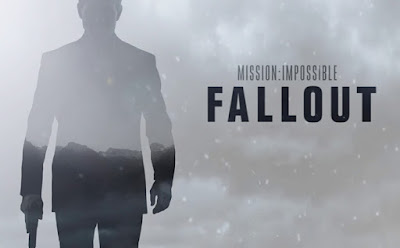"How many times has Hunt's government betrayed him, disavowed him, cast him aside? How long before a man like that has had enough?"
Until this point the ‘Mission: Impossible’ franchise has
been five directors each creating their idealised version of the spy movie.
However, with the latest instalment ‘Fallout’ marking the first time in which a
director has returned to helm a second instalment of the franchise, there’s an
added element of intrigue. Christopher McQuarrie guided ‘Rogue Nation’ to
unprecedented levels of success so the question is less about whether he can
deliver a good film, but can he even hope to top his last effort?
After a terrorist organisation made from the remnants of The
Syndicate steal three plutonium cores, Ethan Hunt (Tom Cruise) and the IMF must
join forces with CIA assassin August Walker (Henry Cavill) to recover the
missing objects before they are used to wreak mass destruction. But as various
faces from the past start to resurface, Ethan’s mission rapidly becomes
decidedly more complicated.
Roger Ebert once referred to a sub-genre of action cinema
that he referred to as the “bruised forearm movie”. The kind of film that isn’t
just exhilarating, but is relentless in its action to a point where you find
yourself grabbing the arm of whoever is next to you just to feel secure for a
second. It unfolds at a speed that absorbs the audience from the opening frame
and refuses to release them until the closing credits. Despite being nearly 2 ½
hours long I was honestly afraid to blink out of fear that the movie would fly
by in that split second.
There’s a beautiful rhythm to the way McQuarrie’s film
unfolds that makes it comparable to some of the greatest films ever to come
from the action genre. The relentless momentum of ‘Raiders of the Lost Ark’,
tension filled set pieces of ‘Die Hard’ and the constant motion of ‘Mad Max:
Fury Road’, they can all be found within ‘Mission: Impossible – Fallout’ as
well. On a structural level the film just flows seamlessly from one astonishing
set piece to the next, always filling it’s time with a point of intrigue to
keep the audience in a constant state of suspense.
In an age where so many action movies concern themselves
with mindless spectacle, McQuarrie has helmed a film of such stunning
craftsmanship that it almost defies belief. It’s assembled in such a way so
that every stunt is so wildly ambitious that just thinking about orchestrating such
a feat is insane. But then amid all of the death defying stunt work, McQuarrie
never makes a scene feel strained or overloaded. Everything has a cohesive
narrative to it, as if each scene is communicating its own short story that
then serves the greater narrative of the film as a whole. Nothing is left
uncertain and everything remains crystal clear, both on a momentary level from
one shot to the other and on a broader story level.
It helps that McQuarrie has so many talented collaborators
to execute each element with the utmost care. Rob Hardy’s cinematography
renders every shot as a gorgeously framed and exquisitely composed work of art.
The way these shots are edited together by Eddie Hamtilton comnstantly conveys
a sense of motion without ever feeling overwhelming. The musical score by Lorne
Balfe accentuates and punctuates the rhythm of each arrangement. On every
technical level the film just moves on with beautiful synchronicity.
It’s easy to dismiss the plot of a film like ‘Fallout’ to be
secondary, and in a certain sense it is. The movie knows full well that the
story is more of a framework from which to hang thrilling sequences on. But
where this film excels is how it evokes a sense of intrigue through the plot
without becoming convoluted. In the same way that his high octane scenes have a
pulsating rhythm, McQuarrie bestows that same sense of purposefulness to his
dialogue as well. No scene exists as an obligation, as every moment of the film
seeks to further the narrative or the characters in some significant way.
After a while you become so deeply invested in the
characters that their ever changing dynamic can be thrilling enough on its own.
What makes the process even better is how the film intertwines the development
of the characters with the kinetic pace of the action. It’s where the set
pieces go from being more than just spectacular, they become cathartic for the significance
they hold to the characters and themes of the movie. It also allows the script
to inject some unexpected emotional weight into the unfolding plot. Even at its
most joyous ‘Mission: Impossible – Fallout’ remains focussed and grounded
through endowing each character with a personal stake in the situation.
It is hard to go into detail over what makes the cast of the
film amazing without giving away plot spoilers regarding their characters. So
much of the film’s set up involves ambiguous motives and hidden agendas, which
every actor within the film evokes perfectly. The likes of Henry Cavill and
Rebecca Ferguson create such a strong impression without ever losing the
suspense of what motivates their characters or where their allegiances lie.
Simon Pegg and Ving Rhames bring such brilliant personality to their supporting
roles that just further adds to the appeal of the movie.
Ultimately though it’s Cruise himself who seems to own the
film. A lot has already been said about Cruise’s stunt work, which goes above
and beyond what any other actor within the action genre is currently doing. But
I think an undervalued part of Cruise’s significance in these films is how he;s
fortunate enough to work with filmmakers who always want to display his face. Whether
it’s a boke chase through Paris or aerial combat in a helicopter, McQuarrie
constantly gives the audience a glimpse of Cruise’s intense and frantic expressions.
Maybe even more so than the physicality of the stunts, it’s Cruise’s
expressionism that well and truly sells each moment.
Spectacular on every conceivable level, ‘Mission: Impossible
– Fallout’ is a masterpiece of action cinema and sets a new standard not just
for this franchise, but the entire genre.


















